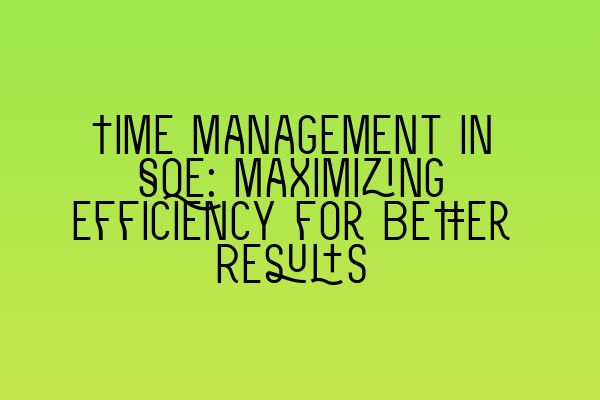Time Management in SQE: Maximizing Efficiency for Better Results
As a solicitor preparing for the Solicitors Qualifying Examination (SQE), effective time management is key to maximizing your efficiency and achieving better results. With a heavy load of study materials, practice exams, and mock tests, it can be overwhelming to stay organized and ensure you are covering all the necessary topics. In this article, we will discuss some strategies and techniques to help you effectively manage your time and boost your productivity in SQE preparation.
1. Create a Study Schedule
One of the first steps in mastering time management is to create a study schedule. Determine the amount of time you can dedicate to studying each day and allocate specific time slots for different subjects or topics. This will help you maintain a structured approach to your preparation and ensure you cover all the essential areas. By following a schedule, you can avoid last-minute cramming and reduce the risk of burnout.
To create a study schedule, try utilizing online tools like study planners or mobile apps that can help you organize your time effectively. Set realistic and achievable goals for each study session and make sure to include breaks to rest and recharge.
2. Prioritize Your Study Material
SQE preparation requires covering a vast amount of study material, including textbooks, legal frameworks, case law, and practice questions. It is crucial to prioritize your study material based on importance and relevance. Identify the core topics and subject areas that carry more weight in the exam and focus your efforts on understanding and mastering them first.
Remember to review your notes and summaries regularly to reinforce your understanding. If you find certain topics particularly challenging, consider seeking additional resources or debrief sessions to analyze your performance and seek guidance on improving your understanding.
3. Break Down Your Study Sessions
Breaking down your study sessions into smaller, manageable chunks can help you stay focused and avoid overwhelm. Instead of studying for long uninterrupted periods, try dividing your study time into smaller sessions of 25-30 minutes, known as the Pomodoro technique.
During each study session, eliminate distractions by turning off notifications on your phone, closing unnecessary tabs on your computer, and finding a quiet space to concentrate. Setting a timer can also help you stay on track and make the most of your study time. After completing a session, take a short break to relax and recharge before moving on to the next session.
4. Practice Time-Bound Questions
Time management is particularly crucial during the SQE exam, as you will have limited time to answer a series of questions. To enhance your time management skills, regularly practice time-bound questions and mock tests. This will familiarize you with the time constraints and help you develop strategies to maximize efficiency during the exam.
Utilize resources like mock exams and SQE answer keys to practice answering questions within the allocated time. Analyze your performance in these practice tests, identify areas where you took longer than expected, and refine your approach to improve your speed and accuracy.
5. Take Regular Breaks
While it may seem counterintuitive, taking regular breaks is essential for effective time management. Studies have shown that our concentration and focus decline after a certain period of continuous study. To maintain productivity and prevent burnout, incorporate short breaks into your study schedule.
During these breaks, engage in activities that help you relax and recharge, such as going for a short walk, practicing mindfulness techniques, or simply taking a few deep breaths. Stepping away from your study materials for a brief period allows your brain to rest and rejuvenate, ensuring you can maintain focus and productivity throughout your study session.
Conclusion
In summary, effective time management is vital for success in SQE preparation. By creating a study schedule, prioritizing your study material, breaking down study sessions, practicing time-bound questions, and taking regular breaks, you can maximize your efficiency and achieve better results. Remember to stay consistent, disciplined, and stay motivated throughout your journey. Good luck!
Related Articles:

Leave a Reply